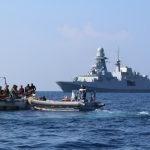European Union Marks Eight Years of Counter-Piracy Commitment to Protect World Food Programme Vessels and Deter Pirate Attacks off Coast of Somalia, but Warns No Room for Complacency
This week the European Union is marking eight years since it launched its first ever maritime military operation, EU NAVFOR Somalia – Operation Atalanta, in response to a surge in armed pirate attacks on merchant ships and other vessels in the Gulf of Aden and the Indian Ocean.
Published 7 years ago, updated 5 years ago


From http://eunavfor.eu/
Back in 2008, increasingly violent attacks by armed pirates were not only causing untold misery to seafarers, but they were also having a significant impact on international shipping, with lost trade and higher insurance premiums costing the maritime industry billions. There were also growing concerns within the United Nations about the safety of the World Food Programme (WFP) vessels delivering much-needed humanitarian aid to displaced people in Somalia.
As a result, and with UN Security Resolutions in place, European Union Member States launched Operation Atalanta in December 2008.
Since its launch, Operation Atalanta warships and maritime patrol aircraft have ensured that 100% of WFP vessels sailing under EU NAVFOR’s protection have remained safe from pirate attack. EU NAVFOR has also prevented and disrupted a significant number of pirate attacks in the Gulf of Aden and the Indian Ocean and as a result, 154 men suspected of committing acts of piracy have been transferred to the EU or regional states for legal prosecution.
Furthermore, during their counter-piracy patrols to deter, disrupt and repress pirates, information gathered on vessels engaged in fishing within Somali waters has been forwarded to the EU’s Directorate-General for Maritime Affairs and Fisheries, DG MARE, in Brussels, as part of international efforts to combat illegal fishing off the coast of Somalia.
Since July 2012 Operation Atalanta sailors and marines have also assisted EU colleagues and EU-sister mission, EUCAP Somalia, to cooperate with regional authorities and help train Somali and local maritime forces to strengthen security and development in the Horn of Africa region. Just this year alone, EU NAVFOR has helped to host members of the Somali Government during the Europe Day celebrations in Mogadishu in May and train maritime forces from Bosaso and Berbera respectively.
A notable success over the past eight years has been the close cooperation and coordination that has developed between the different counter-piracy task forces, independent navies, and maritime industry. By working together and implementing protection measures, pirate attacks have significantly reduced. It is sobering to think that between 2005 – 2012 a total of 385 million US dollars was paid out in ransoms, and at the height of Somali-based piracy in January 2011, over 700 hostages and 32 vessels were being held in pirate anchorages. As of today, none of these ships and their hostages are being held.
Whilst the EU welcomes the suppression of pirate attacks off the coast, Member States recognize that the conditions that enabled piracy to flourish remain in place so there is no room for complacency. On Monday 28 November 2016, the European Council extended Operation Atalanta’s counter-piracy mandate until 31 December 2018.
In the coming year, EU NAVFOR commanders will be working with Somali and regional partners, as well as with the shipping industry, to look at what measures will need to be put in place beyond December 2018 to ensure that Somali-based piracy remains suppressed and seafarers remain safe.
Related to following destinations: Somalia
Related to the following Cruising Resources: Piracy & Security, Piracy-Related Organisations and Websites

